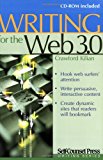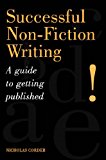Welcome to the third installment of my eight part non-fiction writing course, in which we’ll be looking at opportunities for getting published online.
The bottom line
For established non-fiction writers the advent of e-zines (electronic magazines) and the myriad of websites requiring up-to-date copy (journo speak for content) has proved a double-edged sword. On the one hand, there are far more opportunities to get your work in ‘print’, but financially the rewards are less tangible. As mentioned in my first article in this series (getting started with non-fiction writing) the average print article will earn the writer between £100 – £300, whereas the average e-zine pays far less. Of course, some pay more, but many pay nothing at all, offering simply a link to your own site. It goes without saying that this quid pro quo arrangement will only benefit you if you have your own site, but more of that later.
The future is now
So why write for the web? Quite simply, it’s the present and future of communication, and in case you hadn’t noticed, traditional print media are facing a losing battle. I, like many others, am still hoping that print publishing will be around for a long time, but just in case it isn’t, I’m hedging my bets!
So what opportunities are there for online writers?
E-zines and e-papers
E-zines are online magazines. Some of them are just electronic versions of an existing print title such as Cosmopolitan and Car Magazine. Much of the same content appears online, but in a briefer form. The e-zines are more interactive than their print versions and readers are encouraged to give immediate feedback. Some e-zines require a subscription fee, others just that you sign in (so they can bombard you with advertising), and still others are free and open to all (earning their money from advertising displayed on the site). Some e-zines are on-site only, but many are delivered to you via email. The worst of them are just glorified newsletters. For a good one (I have to say that because I’ve been published by them in the past) check out Absolute Write. In addition to e-zines, all of the leading newspapers have online versions and, happily, pay at the same rate as their print titles (eg The Guardian). For contributions to e-zines and e-papers check out their contributors’ guidelines (simply plug in ‘contributors guidelines’ into your search engine). To get an idea of the range of e-zines out there go to a directory portal such as The Ezine Directory.
Exercise 6:
If you have ideas for populist or commercial articles consider which e-zines you may contribute to.
Wikis
For specialist writers one of the easiest places to get published is on a ‘Wiki’. A wiki is an updatable, collaborative website where the content can be changed by contributors. The best known example is Wikipedia – hailed by educational democrats as the best thing since the printing press, and derided by many academics as dangerously populist and unreliable. If you want to know more about wikis, check out the wiki article in Wikipedia! The problem with wikis is that the content does not necessarily go through the rigorous checks of an editor; however, many of them do have subject editors. You can apply to be an editor or a contributor to a wiki, depending on your level of expertise. Of course, you are unlikely to get paid for a wiki, but it is a good opportunity to promote yourself as a specialist writer.
Exercise 7:
If you have some area of expertise (academic or otherwise) write down some ideas for contributing to a Wiki.
Website content a.k.a copywriting
 Writing content for other people’s websites is usually the domain of the PR or media consultant. However, you could still freelance as a website copywriter. To get an idea of the competition out there, just plug ‘website copywriter’ into your search engine. The best way to get work in this line is to offer to do some copywriting for free for friends and associates then use this as portfolio material when pitching for paid work. You may also want to get hold of Writing for the Web for some specialized advice on the subject.
Writing content for other people’s websites is usually the domain of the PR or media consultant. However, you could still freelance as a website copywriter. To get an idea of the competition out there, just plug ‘website copywriter’ into your search engine. The best way to get work in this line is to offer to do some copywriting for free for friends and associates then use this as portfolio material when pitching for paid work. You may also want to get hold of Writing for the Web for some specialized advice on the subject.
Blogs
In recent years we have seen the explosion of blogs on the internet where it seems every second person you talk to has one. So what is it? None other than a website, but powered by special blog software behind the scenes which makes it very easy to post new content and have it displayed immediately within a template provided by the software. Essentially this means you no longer have to be a web geek to have your own site; the advent of the blog has made it possible for plebs like you and I to manage our own sites.
The other advantage of a blog is the facility to communicate with your readers by allowing them to leave comments on-site. In this way you can build up a relationship with your regular visitors who will hopefully return. And web traffic is the currency of the web. There’s no point having a great site if no-one ever sees it!
Many businesses are even getting in on the act, and using the immediacy of blogging to promote their products and connect with their customers. Often this is done in-house, but there are opportunities for freelancers out there. Generally you have to have a proven track record in blogging though; even better if you’re already known in the blogosphere.
You can find out more in my blogging for writers series.
Blog content
So what do you put on your blog? There are different kinds of blog. The first is basically an online diary where people share their thoughts and reflections on various issues. Take for example The Writing Geek. In some ways, it’s a spin-off of the sought-after newspaper column usually given to veteran industry professionals or well-respected experts in their field. The difference with an online version is that anyone can vent their spleen. Whether anyone wants to read it is another matter. And yet, the democratic nature of online blogging is strangely attractive. Some of the most successful blogs have had fairly arbitrary content and yet they are popular because of the sense of reading the views of an ‘ordinary’ person such as Mighty Girl. Still others are by ordinary people in extraordinary situations such as Girl Blog from Iraq. Even vicars are getting in on the act such as the thought provoking Dave Faulkner.
Other blogs focus on servicing a particular niche or community on the Web, like I’m doing here. Their goal is to share information on a particular niche topic and become known as an expert in the field, with the express intention of attracting large numbers of visitors to the site. It’s a symbiotic relationship: the visitor (hopefully) gets quality information that interests them; the blogger earns a bit of money through advertising, affiliate programs, and other indirect spin-offs like seminars, speaking engagements and the like.
Thirdly there are the out and out business blogs as mentioned earlier, although the lines between this and the previous type can get kind of blurry. The point is there are no hard and fast rules. Each blog has the potential to be completely unique, like the one that provides this cartoon:

Cartoon by Dave Walker. Find more cartoons you can freely re-use on your blog at We Blog Cartoons.
Exercise 8:
Do an internet search on an area that interests you (eg gardening) and find blogs on the subject. Now leave comments on that blog. You should remember some of the principles we spoke about in regard to letters to the editor in the first session on non-fiction writing.
Exercise 9:
Now jot down some ideas you may have on hosting your own blog and draft your first post in no more than 300 words.
Web writing tips
The basic principles of good non-fiction writing style that we discussed in the previous session apply just as much to writing for the web. In addition, you should consider:
- Keep it brief. While an average print magazine article is 1200 words, the average e-zine article is 500 words. ‘Expert’ articles, such as this, can, of course be longer.
- The inverted pyramid formation is coming back into fashion. In the days of literal cut ‘n paste, newspaper editors would actually chop off an article from bottom to top in order to fit the page. The inverted pyramid formula ensured that writers made sure the most important information was at the top of the article, the least at the bottom. Since computers have come into play, it has been easier for sub-editors to manipulate the middle of an article, so writers have been able to construct their material on more of a natural introduction / development / conclusion formation. But the imperative for brief, to-the-point writing (before the surfer clicks to another site) has ensured that the get-it-all-into-the-first-few-paragraphs approach has once again come to the fore.
- Incorporate cross links where possible. The key to developing a presence on the web is cultivating links and relationships with other sites. So whenever possible post links within the text where readers can get more information. If you look back on this article I’ve done just that. The benefit for this is that you don’t have to go off on too many tangents in your text as readers can always get the information they need elsewhere.
Next we’ll be looking at how to write an autobiography. See you then!
 Welcome to The Crafty Writer's free online non-fiction writing course, presented by Fiona Veitch Smith, a freelance journalist, editor, author, playwright, screenwriter and writing teacher. I hope that you'll see a dramatic improvement in the quality of your writing as you work through this course.
Welcome to The Crafty Writer's free online non-fiction writing course, presented by Fiona Veitch Smith, a freelance journalist, editor, author, playwright, screenwriter and writing teacher. I hope that you'll see a dramatic improvement in the quality of your writing as you work through this course. 
Pingback: Non-fiction Writing course at The Crafty Writer
Fiona,
Great post! Thought I would let you know I have moved my blog, The Writing Geek, to my own domain: davidwareonline.com. I need to get hold of you via email, as I would like to interview you for my interview series.
Cheers!
Dave
aka The Writing Geek
Hi dave, thanks for visiting again. I’ve changed the link to your new URL. The new site looks great; I look forward to seeing more of it. And I would be delighted to be in your ‘interview series’ – I’ll send you my contact details ‘offline.’
Hi, Fiona,
Very interesting article. If I had time, I’d start a blog, but it’ll have to wait.
Regards
Verica
Hi Verica,
I’m a reluctant blogger myself. I always resisted doing it because I knew it would eat up my precious time and be very addictive. I was right on both counts! On the plus side, however, it has raised my profile which in turn has resulted in some paying work.
Pingback: Non-fiction - how to write a proposal at The Crafty Writer
Pingback: Beginner Blogging for Writers: part 1 at The Crafty Writer
Pingback: Beginner Blogging for Writers: part 3 at The Crafty Writer
I have just completed the non-fiction part of the creative writing course. I chose writing for the internet as my option whilst I did not find it easy I thought I needed that because I am very inexperienced at working with computers. I found it a reasonable challenge and I am interested in starting the next part of the course.
www.iwriteishare.com,It is a website where users can register themselves , share their articles and start earning with it.
Pingback: Beginner Blogging course at The Crafty Writer
Pingback: Non-fiction travel writing at The Crafty Writer
Hi Fiona,
Just wondering if you or any of your students know anything about Suite101 internet writing. Don’t want to sign my life away until I get some feedback!
Toni
Sorry Toni, I don’t know anything about them. Is it a paying course?